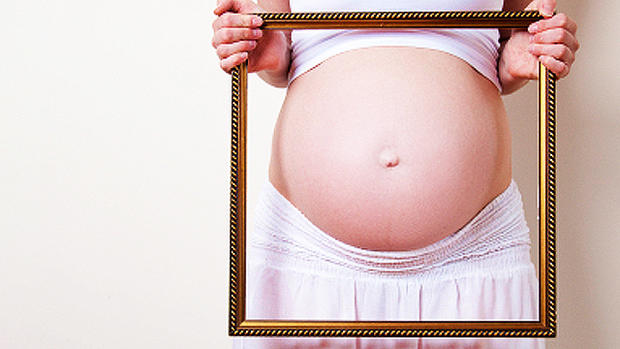Antidepressants during pregnancy change baby's head size, but so does depression: Study
(CBS News) Are pregnant women who take antidepressants risking their baby's or their own health?
PICTURES: 12 crazy myths about pregnancy
It's a common question some women looking to have children ask, and now a new study has found a mix of pros and cons to antidepressant use during pregnancy. Both being depressed and taking antidepressant medication during pregnancy could impact the baby's growth.
For the study, published in the March 5 issue of Archives of General Psychiatry, researchers examined the health of nearly 7,700 pregnant women and the babies they eventually birthed, and determined 99 women used selective serotonin reuptake inhibitors (SSRI) - a family of antidepressants that includes Prozac and Zoloft.
Babies whose mothers took antidepressants were born with smaller heads compared with babies born to mothers in the general population, the study found. Children born to moms taking antidepressants were also twice as likely to be born prematurely, but had no delays in body growth.
What about the moms? The antidepressants helped: Mothers taking them had fewer depressive symptoms. But, the study also found some moms had symptoms of clinical depression but weren't taking SSRI drugs. The researchers found their babies were more likely to be born with both reduced head and body size.
"Fetal body growth is a marker of fetal health and fetal head growth is a marker for brain development," Dr. Hanan El Marroun, a postdoctorate researcher at Sophia Children's Hospital and Erasmus Medical Center in Rotterdam, the Netherlands, told HealthDay. "If the depression is untreated, it affected the whole body; but if the mother used SSRIs, the head growth of the fetus was affected. This may mean that smaller head growth is not explained by depression, but by the SSRIs."
The results suggests a serotonin imbalance is contributing to delays in head growth.
Small fetal head growth has been tied to behavioral problems and psychiatric disorders later in life, the authors said, but they warned more long-term studies are needed before making a recommendation to pregnant moms. "We must be careful not to infer an association of SSRI use in pregnancy with future developmental problems," they wrote.
Other experts weren't concerned with the findings.
"It is very evident that the risks of unmanaged depression by far exceed those theoretical, and yet not proven risks of SSRIs (despite scores of studies)," Dr. Gideon Koren, director of the Motherisk program in Canada, an organization that studies the risks of chemicals, drugs and diseases during pregnancy, told Time.
Nearly 6 percent of pregnant women take antidepressants. According to the Mayo Clinic, depression treatment during pregnancy is essential because a mom might not have the energy to take care of herself or might seek unhealthy habits like drinking, drugs and smoking. What's more, it would put moms at a higher risk for postpartum depression once the baby is born.
The bottom line? The Mayo Clinic recommends if you have depression and are pregnant or considering having a baby, speak with your doctor to weigh the risks against the benefits.

